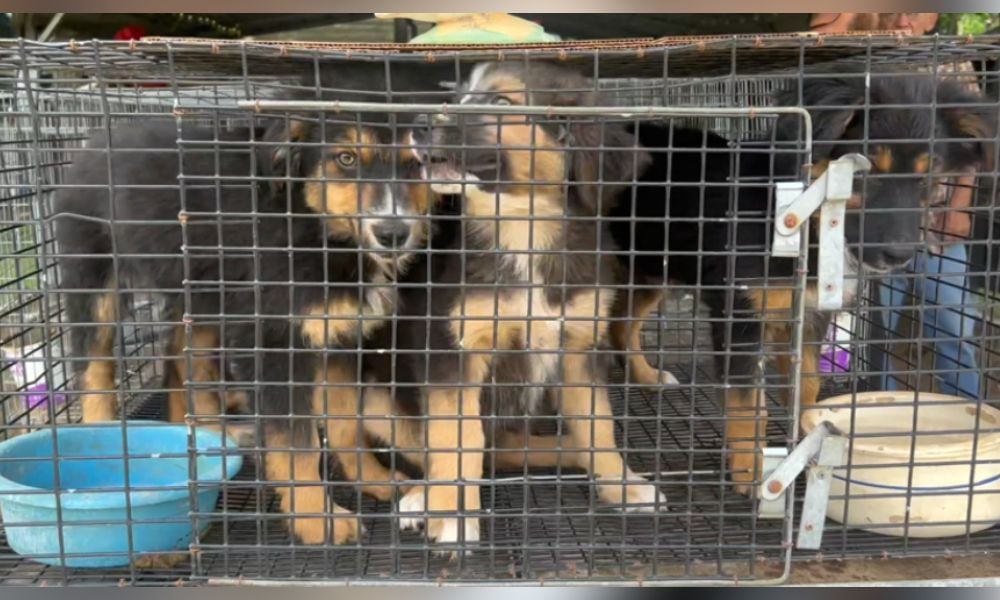On a stretch of land about 60 miles away from Dallas, on the southeast corner of Highways 19 and 64, hundreds of puppies and dogs sit tightly packed into rusted cages and filthy pens — waiting for customers seeking bargain deals at one of Texas’ largest flea markets to take them home.
Known to the local community as “Dog Alley” or “Dog Town,” the marketplace has been the subject of numerous news articles and undercover investigations and campaigns by reputable animal welfare agencies, as well as a spattering of online blogs, reviews, comments, and several petitions alleging heartbreak following the purchase of sick or dying dogs.
The strip, which stretches for longer than the eye can see and operates monthly alongside Canton Trade Days First Mondays flea market, has property lines that state officials told Lady Freethinker are “tricky.”
Part of it lies within the city of Canton and is under the jurisdiction of local law enforcement, while another section with “nebulous” boundaries is overseen by the Van Zandt County Sheriff’s Office, according to the Sheriff’s public information officer.
While there are differences in the claims of whose “issue” Dog Alley is, what’s undeniable is that these dogs need help.

Inside Dog Alley (Lady Freethinker Investigation)
A Lady Freethinker (LFT) investigation this year showed conditions haven’t improved — at all — for hundreds of puppies, kittens, rabbits, hedgehogs, live birds and many other species sold at the flea market.
An undercover investigator who visited more than 50 vendors selling puppies at Dog Alley in April documented deplorable conditions — including vulnerable puppies crammed into filthy and feces-encrusted cages and crates, dogs kept in muddy and flooded enclosures, a majority of puppies without immediate access to clean water, and puppies left exposed to the elements or kept in tiny cages with wire-strand flooring that offered no protection for their sensitive paws.

Inside Dog Alley (Lady Freethinker Investigation)
The investigator also documented puppies with health issues, including red and irritated eyes, weeping eyes, overgrown nails and bloated stomachs, as well as vendors selling puppies who were less than 8 weeks old — the state-mandated minimum for puppy sales, given that the animals’ immune systems aren’t fully developed till then.
Numerous vendors with puppies older than 4 months also told the investigator the dogs had not yet been vaccinated for rabies — in direct violation of Texas law. Meanwhile, state authorities told LFT that Texas has the highest rate of rabies in the entire country, with an estimated 800 cases each year.
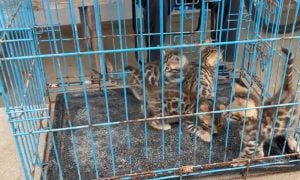
Inside Dog Alley (Lady Freethinker Investigation)
Curry Trade Grounds and RV Park, which owns the property, did not respond to media inquiries prior to publication.
But in 2013, following an exposé by the Humane Society of the United States documenting unsanitary conditions and puppies with likely health problems, Morgan Elliott, an attorney for the trade grounds, told The Dallas Morning News that the organization “doesn’t condone animal cruelty or neglect and has rules in place to ensure animal safety and welfare.”
Elliott also made the following statement to news in 2014: “If it is brought to our attention that any vendor has been found guilty of keeping their animals in an unsanitary condition, we do not allow these vendors to continue to sell their puppies on our property.”
LFT’s investigator also documented birds and other small animals crammed into filthy cages and languishing in muddy and flooded enclosures — conditions known to contribute to the spread of zoonotic diseases.
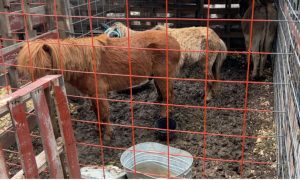
Inside Dog Alley (Lady Freethinker Investigation)
Numerous other states have passed laws against open-air sales of live dogs to curtail preventable suffering — and it’s high time that Texas does the same.
Lady Freethinker has alerted local, state, and federal authorities about the conditions in this report and is not publicly naming the breeders so as not to jeopardize any investigations.
Canton Police Chief Brad Allison responded the day after we alerted the department, saying that he was “concerned and appalled” by the documented conditions and that he was immediately authorizing changes to increase patrolling and enforcement in the area.
Sick and Suffering Puppies
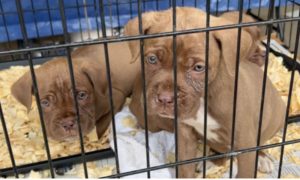
Inside Dog Alley (Lady Freethinker Investigation)
In 2021, the Texas Attorney General’s Office fielded an official complaint from a consumer who reportedly purchased a sick puppy at Dog Alley, which Lady Freethinker obtained via a public records request.
The complaint alleged that the tiny Pembroke Welsh Corgi, purchased for $1,250, soon showed signs of illness, including rectal bleeding, lethargy, and an unwillingness to eat or drink. Veterinary documents attached to the complaint also show the puppy had diarrhea and tested positive for Parvo and hookworms. The consumer reported she had never received the promised paperwork documenting the puppy was registered through the American Canine Association.
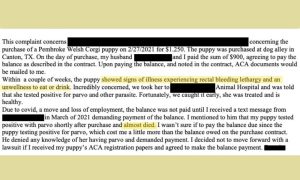
Consumer Complaint About Dog Alley (Texas Office of Attorney General/ Emphasis: Lady Freethinker)
Interestingly, the 1-page puppy purchase agreement, also included in the complaint, dedicated significant space to conditions that voided a promised health guarantee for consumers.
Provisions included that if the puppy were not vet checked within 48 hours, the guarantee was void; if the puppy needed to be euthanized and the breeder was not contacted prior to that procedure, the health warranty was void; and if the dog died, the customer would pay for the necropsy.
The contract also included a long list of conditions not covered by the 48-hour health guarantee, including coccidiosis, Giardia, crud, hypoglycemia, diarrhea, and worms.
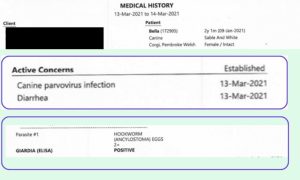
Consumer Complaint About Dog Alley (Texas Office of Attorney General/Emphasis: Lady Freethinker)
The same breeder who reportedly sold the consumer the puppy in 2021 was on-site at Dog Alley when LFT’s investigator visited in 2023. At the breeder’s booth, the investigator documented a long-coated French bulldog who appeared ill and had eye discharge and also morkies covered in urine with overgrown nails.
“It was clear that the breeder doesn’t provide basic grooming,” the investigator said. “Not only did the morkie I held have very long nails but so did everyone else at their booth.”
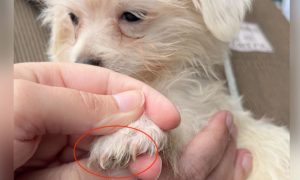
A Morkie Covered in Urine With Long Nails at Dog Alley (Lady Freethinker Investigation)
Across more than 50 stalls, the investigator noted additional concerns, including excessive flies, rusted cages coated with fecal matter, numerous dogs without access to clean water, dogs scratching themselves, kittens caged without a litter box, dogs with recently-cropped ears who still had their stitches in place, and a puppy whose cropped ear was covered with tape to try to “post” it — or get it to stand up.
At one stall, tiny pomskys with pale gums and irritated red skin visible through their fur reportedly had been attacked and “tore up” unexpectedly by fire ants, according to vendor comments.
At another stall, puppies selling for $1,000 each had bloated stomachs and only filthy water to drink and cowered in a corner as their seller’s assistant poured half a bag of shavings directly onto them from outside of the pen at chest height.

Dogs With Filthy Water Dog Alley (Lady Freethinker Investigation)
At still another stall, a Shar Pei with inward-turning eyelids appeared to be struggling to see, with the vendor saying the eyes needed to be “tacked” — a surgical procedure involving temporarily stitching the eyelids to roll them outwards.
Vendors also appeared to minimize the possible health impacts to dogs being sold with improperly treated conditions — such as one vendor who told the investigator that cherry eye in a dog for sale would be a “straightforward fix.”

A Dog With Reported Cherry Eye at Dog Alley (LFT investigation)
Maureen D’Souza-Borja, a veterinarian with a specialty in emergency medicine who reviewed footage provided by Lady Freethinker, took immediate issue with that assessment.
“Cherry eye surgical repair procedures are not always straightforward,” D’Souza-Borja told LFT. “Very often they can recur and be a constant source of irritation or inflammation for patients. It can be incredibly frustrating for prospective owners as they might need upwards of 2-3 procedures per eye… It is generally disingenuous of this seller to say it is a very straightforward fix.”
D’Souza-Borja also was concerned that many of the puppies in the documented conditions did not have sufficient space to carry out a variety of normal behaviors, should have clean water available at all times, and should have their nails regularly trimmed.
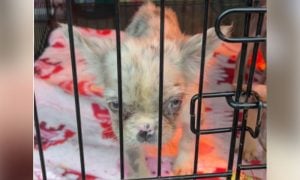
A Puppy With Eye Discharge At Dog Alley (Lady Freethinker Investigation)
She also noted that several of the dogs appeared to be underweight, lethargic, and suffering from medical conditions including conjunctivitis, Buphthalmos (enlarged eyes) and strabismus (crossed eyes).
At least three vendors also were advertising dogs less than 8 weeks old, or the age when their immune systems are reportedly fully developed — making them particularly vulnerable to the conditions observed by LFT’s investigator.

(Lady Freethinker Investigation)
Some of the dogs and puppies for sale also appeared to have been left at Dog Alley overnight without adequate shelter from the elements — specifically, an overnight storm that raged over the area.
After the storm, the investigator documented donkeys and horses confined to a stall with wet, muddy ground and brown water, with only a tarp dangling down to protect the animals from the elements. The investigator also documented puppies, birds, and other animals inside a flooded enclosure with standing puddles.
That morning, a separate vendor apologized to the investigator for the state of his advertised dogs, who appeared soaking wet and covered in mud.
“The breeder apologized for the puppies looking the way they do but said they were outside all night and rain kept coming in on them,” the investigator said.
Public Health and Safety Risks
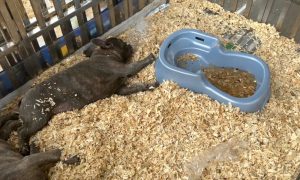
Inside Dog Alley (Lady Freethinker Investigation)
D’Souza-Borja, the veterinarian who reviewed LFT’s footage, said the puppies documented scratching themselves likely were suffering from ectoparasites, such as fleas, mites, or ticks.
She also noted that ectoparasites can cause various zoonotic diseases, or diseases that can jump to humans — including Lyme disease, bartonellosis, Rocky Mountain Spotted Fever, or ehrlichiosis — and added that the risk of both endoparasite and ectoparasite exposure in Texas is “incredibly high.”
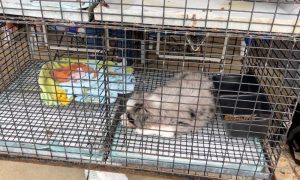
Inside Dog Alley (Lady Freethinker Investigation)
Texas also has the highest number of animals who test positive for rabies in the country, said Lara Anton, a senior press officer with the Texas Department of State Health Services.
“Approximately 800 animals test positive every year,” Anton told LFT via email. “We do see rabies in puppies and often more than one in a litter. It is more likely for people to handle puppies, even if they are under observation, which puts more people at risk of a potential rabies exposure.”
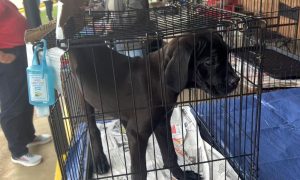
A Puppy Inside a Small Cage At Dog Alley (Lady Freethinker Investigation)
Texas requires that all dogs and cats are vaccinated against rabies by the age of 4 months. But at least four of the vendors selling dogs older than 4 months at Dog Alley told the investigator their puppies weren’t yet vaccinated against rabies.
Anton said her department is not aware of any rabies outbreaks from flea markets but said it was “certainly possible” for an unvaccinated dog to contract rabies.
“The issue is, if the puppy is exposed (knowingly or unknowingly), prior to rabies vaccination, the animal can still develop rabies and determining which individuals were exposed in a situation such as a flea market would be extremely challenging,” she said.

(Lady Freethinker Investigation)
D’Souza-Borja also spoke to the importance of the Texas vaccination law.
“The risk is not zero percent, and the fatality rate of any animal exposed to rabies is 100 percent,” she said.
D’Souza-Borja added that any puppies housed for extended periods in a high-density, outdoor setting such as the flea market would be susceptible to additional contagious diseases, including distemper, Adenovirus, Parainfluenza, Parvo, Leptospirosis, and Bordetella — some of which can spread to even properly vaccinated dogs.
But the public impact also appeared to extend beyond human health and safety, with one vendor — who had sold only four of 33 puppies he brought to Dog Alley — telling the investigator that any dogs he couldn’t sell he would reroute to already strapped shelters or rescues.
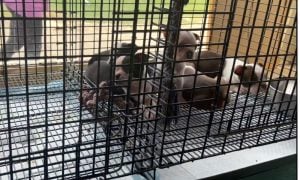
Inside Dog Alley (Lady Freethinker)
Police Authorize Immediate Changes Following LFT Investigation
Canton Police Chief Brad Allison told LFT he authorized immediate changes after seeing our investigator’s footage.
“In review of your investigation, I am obviously concerned and appalled by what your investigator documented,” he wrote in a letter sent via email. “As such, I have instructed our animal care officers to remain present in the Dog Alley area for the duration of First Monday weekend and to take enforcement actions on any violations within their purview.”
Allison also authorized overtime for the officers to check in on each vendor detailed in our report and to perform their own investigations. He added that he would reach out to the SPCA of Texas to coordinate investigation efforts as well.
Texas Can Do Better, And How You Can Help
As long as Texas allows largely unregulated sales of dogs at flea markets, defenseless dogs, puppies, and other species are likely to suffer.
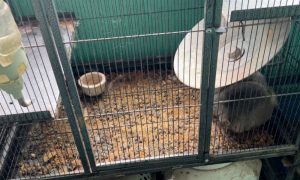
A Filthy Cage With a Small Animal at Dog Alley (Lady Freethinker Investigation)
The good news is that several states have enacted laws restricting open-air sales of puppies at flea markets — including Louisiana, Nevada, Oklahoma and Virginia — and there’s no reason Texas can’t do the same.
If you live in Texas, please call or write to your legislators and let them know you want to see a ban on these cruel sales. If you, or someone you know, has purchased a sick puppy in Texas, please file an official complaint with the Attorney General’s Office. If you’ve witnessed possible abuse or cruelty to animals at a flea market, please take photos or videos as evidence if possible and submit a report to law enforcement and animal control.
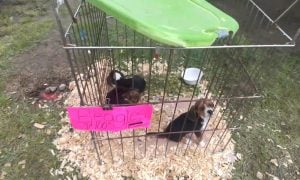
Inside Dog Alley (Lady Freethinker Investigation)
The authorities who specifically oversee welfare compliance at Dog Alley include the following:
- Canton Police Department via phone at 903-567-4991
- Van Zandt County Sheriff’s Office via phone at 903-567-4133 or email: [email protected]
- SPCA of East Texas’s cruelty complaint form, available here
- Texas Attorney General: Purchasers of sick puppies can file a consumer complaint here.
The city of Canton’s website also invites those with feedback on city operations to contact the city’s administration via email at [email protected]. Please consider respectfully sending an email letting her know you’d like to see a First Mondays that doesn’t permit the sale of live animals at flea markets.
If you haven’t already, please also take a moment to speak up for dogs, puppies, and other animals for sale at Texas flea markets by signing our petition.

